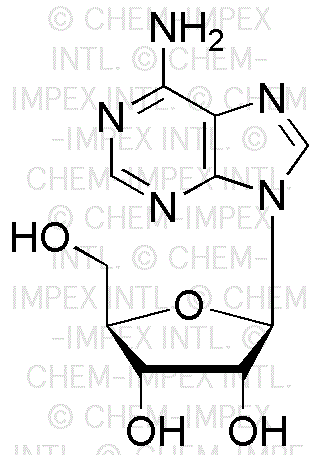Adenosine is widely utilized in research focused on:
- Cardiovascular Medicine: It plays a crucial role in managing heart conditions, particularly in treating arrhythmias and improving blood flow during cardiac stress tests.
- Neurology: Researchers explore its neuroprotective effects, making it a potential therapeutic agent for conditions like stroke and neurodegenerative diseases.
- Pharmaceutical Development: Adenosine is a key component in drug formulations aimed at enhancing the efficacy of various medications, especially in cancer therapies.
- Cell Biology: It is used in cell culture studies to understand cellular signaling pathways and energy metabolism, providing insights into cellular functions.
- Biotechnology: Its applications extend to the development of biosensors and diagnostic tools, enabling rapid detection of biological markers in medical diagnostics.
General Information
Properties
Safety and Regulations
Applications
Adenosine is widely utilized in research focused on:
- Cardiovascular Medicine: It plays a crucial role in managing heart conditions, particularly in treating arrhythmias and improving blood flow during cardiac stress tests.
- Neurology: Researchers explore its neuroprotective effects, making it a potential therapeutic agent for conditions like stroke and neurodegenerative diseases.
- Pharmaceutical Development: Adenosine is a key component in drug formulations aimed at enhancing the efficacy of various medications, especially in cancer therapies.
- Cell Biology: It is used in cell culture studies to understand cellular signaling pathways and energy metabolism, providing insights into cellular functions.
- Biotechnology: Its applications extend to the development of biosensors and diagnostic tools, enabling rapid detection of biological markers in medical diagnostics.
Documents
Safety Data Sheets (SDS)
The SDS provides comprehensive safety information on handling, storage, and disposal of the product.
Product Specification (PS)
The PS provides a comprehensive breakdown of the product’s properties, including chemical composition, physical state, purity, and storage requirements. It also details acceptable quality ranges and the product's intended applications.
Certificates of Analysis (COA)
Search for Certificates of Analysis (COA) by entering the products Lot Number. Lot and Batch Numbers can be found on a product’s label following the words ‘Lot’ or ‘Batch’.
Numéro de catalogue
Numéro de lot/série
Certificates Of Origin (COO)
This COO confirms the country where the product was manufactured, and also details the materials and components used in it and whether it is derived from natural, synthetic, or other specific sources. This certificate may be required for customs, trade, and regulatory compliance.
Numéro de catalogue
Numéro de lot/série
Safety Data Sheets (SDS)
The SDS provides comprehensive safety information on handling, storage, and disposal of the product.
DownloadProduct Specification (PS)
The PS provides a comprehensive breakdown of the product’s properties, including chemical composition, physical state, purity, and storage requirements. It also details acceptable quality ranges and the product's intended applications.
DownloadCertificates of Analysis (COA)
Search for Certificates of Analysis (COA) by entering the products Lot Number. Lot and Batch Numbers can be found on a product’s label following the words ‘Lot’ or ‘Batch’.
Numéro de catalogue
Numéro de lot/série
Certificates Of Origin (COO)
This COO confirms the country where the product was manufactured, and also details the materials and components used in it and whether it is derived from natural, synthetic, or other specific sources. This certificate may be required for customs, trade, and regulatory compliance.


